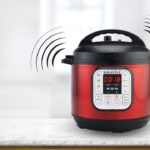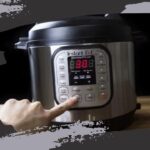Air fryers have become a staple in modern kitchens, quickly gaining popularity for their ability to cook food with minimal oil and create delicious, crispy results. However, as with any electrical appliance, air fryers can pose a fire hazard if not used correctly.
The potential for fires is not something to take lightly, as even a small kitchen fire can have disastrous consequences. This article will provide you with a comprehensive understanding of air fryer fire hazards and offer valuable insights on how to keep you and your loved ones safe in the kitchen.
Understanding the Heating Mechanism
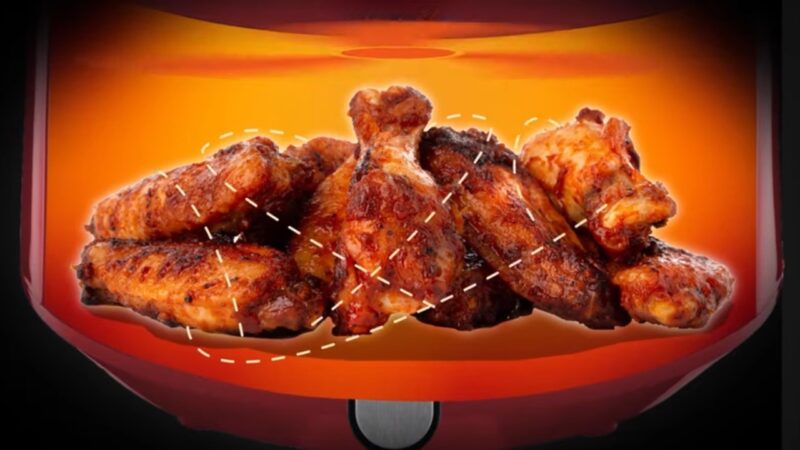
They work by circulating hot air around the food, effectively simulating the frying process without the need for large quantities of oil. To achieve this, they rely on a heating element and a fan. The heating element, usually located at the top of the air fryer, is responsible for generating heat, while the fan circulates the hot air evenly around the food. This combination of heat and air movement is what makes air fryers so efficient at cooking food quickly and evenly.
The Importance of Proper Maintenance
Keeping your air fryer clean and well-maintained is critical for preventing fires. Over time, food particles, grease, and oil can accumulate inside the appliance, creating a potential fire hazard. Regular cleaning, especially after each use, is essential to ensure that your air fryer remains safe to use. Follow the manufacturer’s instructions for cleaning your specific model, and always unplug the appliance before cleaning.
Potential Fire Hazards
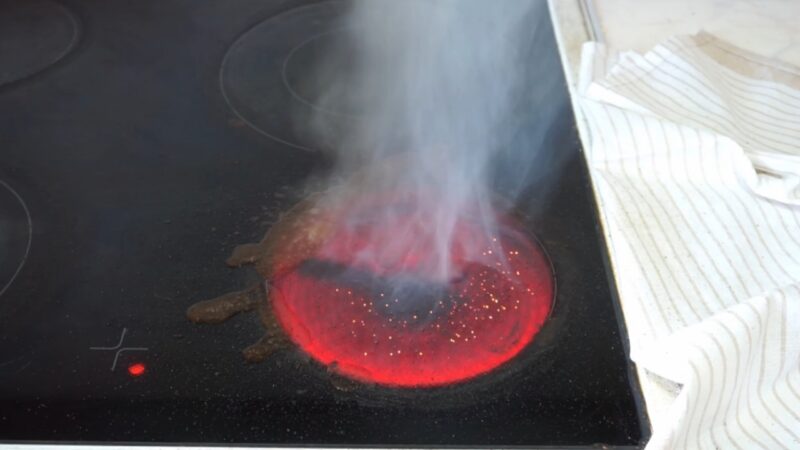
One of the most significant fire hazards associated with air fryers is the buildup of oil and grease. Even though air fryers require less oil than traditional frying methods, some recipes still call for a small amount. This oil can accumulate over time, especially if the appliance is not properly cleaned. If left unaddressed, this buildup can ignite and cause a fire. To minimize the risk, ensure you clean your air fryer thoroughly after each use and avoid using excessive amounts of oil.
The Dangers of Using Damaged Cords
Damaged or worn-out power cords can also pose a fire hazard when using an air fryer. Over time, the insulation on power cords can wear down or become damaged, exposing the internal wiring. This increases the risk of a short circuit, which can lead to a fire. Regularly inspect your air fryer’s power cord for signs of wear and damage, and replace it immediately if you notice any issues.
Overloading and Overheating Issues
Overloading it by putting too much food in the basket can lead to uneven cooking and potential overheating. When the appliance is overloaded, the hot air cannot circulate effectively, causing it to work harder and potentially overheat. Overheating can cause the internal components of the air fryer to become damaged and increases the risk of a fire. To avoid this, always follow the manufacturer’s guidelines on food capacity and avoid overcrowding the air fryer basket.
The Role of Temperature Control
Using the correct temperature and cooking times is essential for preventing fires in your air fryer. Many air fryers come with built-in temperature controls and timers, which help ensure that the food is cooked at the right temperature and for the appropriate amount of time. Setting the temperature too high or cooking the food for too long can lead to overheating and increase the risk of a fire. Always follow the manufacturer’s guidelines and recommended cooking times for your specific model to ensure safe cooking practices.
Common Mistakes
There are several common mistakes that can increase the risk of a fire. These include using the wrong type of oil, using damaged or incompatible accessories, and placing the air fryer too close to flammable materials. By being aware of these potential pitfalls and taking steps to avoid them, you can significantly reduce the risk of an air fryer fire in your kitchen.
Safety Tips
To ensure the safe use of air fryers in your home, follow these safety tips:
- Read and follow the manufacturer’s instructions for your specific air fryer model.
- Keep it clean and well-maintained to prevent oil and grease buildup.
- Regularly inspect the power cord for damage and replace it if necessary.
- Avoid overloading the basket and always use the correct temperature and cooking times.
- Use only approved accessories and never attempt to modify your air fryer in any way.
- Keep it away from flammable materials and ensure adequate ventilation when in use.
- Never leave the air fryer unattended while cooking.
When to Replace Your Air Fryer
While they are generally considered safe to use, they may eventually require replacement to ensure optimal safety. One common sign that it’s time to replace your air fryer is if it starts to malfunction, such as producing uneven heat or failing to turn on properly. This could indicate that the heating element is damaged or the internal wiring is faulty, which could pose a fire hazard.
Another sign that it’s time to replace your air fryer is if it shows signs of physical damage, such as cracks, dents, or warping. This could also be a sign that the unit is no longer functioning as intended and could pose a safety risk. Additionally, if it is more than five years old, it may be time to consider replacing it. While the lifespan of an air fryer can vary depending on usage and maintenance, older units may be more prone to malfunction and safety issues.
It’s important to prioritize safety when using any kitchen appliance, including them. Regularly inspecting your unit for signs of wear and tear, following manufacturer guidelines for use and maintenance, and replacing your air fryer as needed can help ensure optimal safety and prevent potential hazards.
Emergency Procedures
In the event of a fire, it’s crucial to know how to respond quickly and safely. Follow these emergency procedures:
- Turn off the air fryer and unplug it from the electrical outlet.
- If the fire is small and contained, use a fire extinguisher to put it out. Be sure to use a Class B extinguisher, which is designed for grease fires.
- If the fire is too large or out of control, immediately evacuate the area and call 911.
- Do not attempt to move the air fryer or use water to extinguish the fire, as this can make the situation worse.
The Importance of Having a Fire Extinguisher
Having a fire extinguisher in your kitchen is an essential safety measure that can help prevent a small fire from turning into a disaster. Ensure that you have a Class B fire extinguisher, which is designed for grease fires, and know how to use it properly. Familiarize yourself with the PASS method (Pull the pin, Aim at the base of the fire, Squeeze the handle, and Sweep side-to-side) and make sure everyone in your household knows how to use the extinguisher in case of an emergency.
FAQs
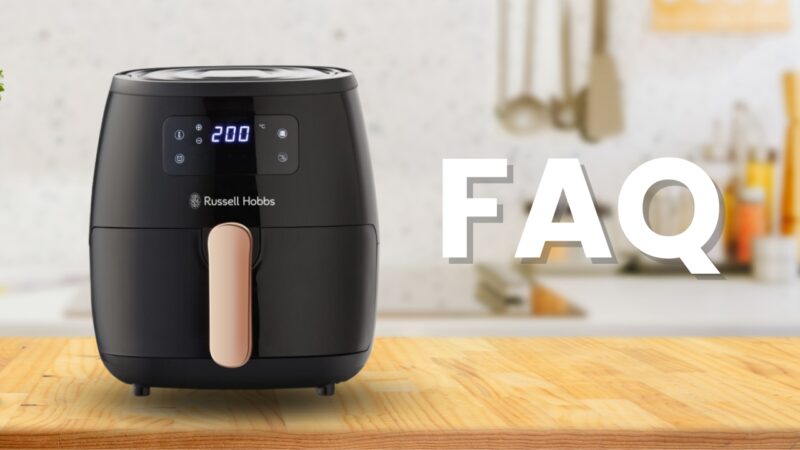
Can I use my air fryer without the basket?
No, the basket is an essential component of the design, allowing for proper air circulation and even cooking. Using it without the basket can lead to uneven cooking and increases the risk of overheating.
Should I preheat my air fryer before cooking?
Some manufacturers recommend preheating for a few minutes before cooking to ensure optimal cooking results. However, this is not always necessary. Always follow the instructions provided by the manufacturer for your specific model.
Can I leave my air fryer unattended while cooking?
It is not recommended to leave it unattended while in use. Always monitor the cooking process to prevent overheating or other issues that could lead to a fire.
Is it safe to use an extension cord with my air fryer?
While it’s generally best to plug it directly into a wall outlet if you must use an extension cord, make sure it’s a heavy-duty cord with a suitable rating for the appliance’s power requirements. Using an undersized or low-quality extension cord can increase the risk of overheating and fire.
How much space should I leave around my air fryer while in use?
To ensure proper ventilation and prevent overheating, leave at least five inches of clearance on all sides. Keep it away from flammable materials, such as curtains, paper towels, or kitchen towels, and avoid placing it underneath cabinets.
Can I use my air fryer on a wooden or plastic countertop?
While they generally do not generate significant external heat, it’s still essential to place the appliance on a heat-resistant and stable surface, such as a granite or metal countertop. Avoid using wooden or plastic countertops, as they can potentially become damaged over time due to heat exposure.
How do I know if my air fryer is overheating?
Signs of overheating may include excessive heat on the exterior, a burning smell, or smoke. If you suspect overheating, turn it off immediately, unplug it, and allow it to cool down before attempting to address the issue. Check for any obstructions, oil buildup, or other potential causes of overheating, and consult your manufacturer’s guidelines for troubleshooting.
Conclusion
In conclusion, while air fryers are generally considered safe and convenient cooking appliances, they can pose a fire hazard if not used and maintained properly. By following the tips and guidelines provided in this article, you can significantly reduce the risk of an air fryer fire and ensure the safety of your kitchen and your loved ones. Remember, prevention is key, and taking the necessary precautions can help you enjoy the many benefits of your air fryer without worrying about potential dangers.


